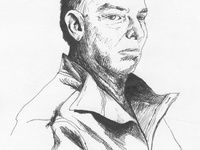At Harvard, he received a Masters in 1965 and completed his doctoral thesis in government a year later to obtain his Ph.D. The University recognized his enthusiasm, retaining him as a lecturer in the recently-established but selective Social Studies concentration where he would serve as head tutor between 1967 and 1971.
In his academic role and his subsequent position as South House Master, former South House Committee Co-President Nancy E. Toff ’76 says that Peretz developed close relationships with his students.
“He always had a coterie around him,” she says. “It was an intellectual coterie, however, and mostly consisted of students within the Social Studies department.”
According to some of these students, Peretz was a decisive influence on their intellectual pursuits and career paths.
MIT Professor Sherry R. Turkle ’69 says she embarked on her initial research following Peretz’s encouragement. He told her that the her seemingly esoteric interest in French scholars’ indifference towards Freudian theory could in fact lead to a compelling senior thesis.
“Dr. Peretz was a great teacher and gave me confidence in my abilities at a time when I needed that,” she says. “He encouraged me to have confidence in myself and to become an academic when this seemed to me to be a great reach.”
Peretz left Harvard in 1975 to head up The New Republic, a political magazine that he had purchased a year earlier. He would remain there as editor-in-chief through 2010, helping mold the magazine’s liberal slant and hawkish approach to American foreign policy.
But Peretz all the while retained his ties to the University and, in 1993, he contributed to the establishment of the Martin Peretz Chair in Yiddish Literature.
E. J. Dionne ’73, a former student of Peretz’s, says that the professor’s unique capacity to engage with his students led to the support for him that endures despite his controversial statements.
“Many of us wish Marty had not written some of the things he wrote and we told him that,” Dionne says. “But for me at least—and I know lots of others who feel this way—it was simply impossible to forget, ignore, or write off Marty’s passion for his students, his eagerness to help us, how much energy he put into his teaching, and how he stayed connected to people after they graduated.”
CONFLICTING LEGACIES
The clash between his dueling legacies came to the forefront in the days leading up to the Social Studies celebration in September.
Turkle and Dionne had joined 43 others, including former Vice President Al Gore ’69, in soliciting support for the $650,000 Martin Peretz Undergraduate Research Fund. The fund was in honor of “an inspiring teacher, mentor, and scholar who was an architect and steward of the Social Studies program from the 1960s through the early 1990s.”
Primarily devoted to juniors pursuing thesis research, the fund gives priority to social or political theorists and those studying either multiculturalism, social justice, or inequality.
But when word of the fund spread, many said that, given Peretz’s history of controversial views, the University was sending the wrong message in accepting the fund.
Read more in News
Giusti Tells HBS Grads to ‘Do Good’













